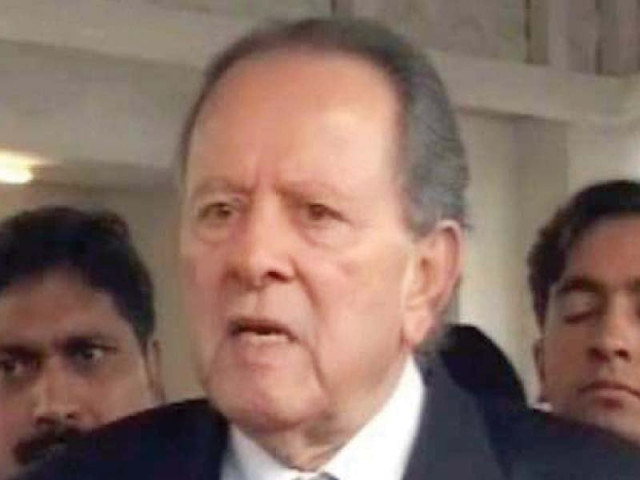Architect of Constitution Hafeez Pirzada dies
In 1979, he signed the roll of senior advocates of the Supreme Court

The architect of the 1973 Constitution and prominent lawyer, Abdul Hafeez Pirzada, passed away in London on Tuesday. He was 80. His younger brother, Abdul Mujeeb Pirzada, confirmed that Hafeez had been hospitalised in London for over a month.
The prominent lawyer, who had last represented Imran Khan’s Pakistan Tehreek-e-Insaf (PTI) in the judicial inquiry commission probing the May 2013 elections, had recently had a surgery on his intestine, but that resulted in medical complications leading to multiple organs failure.
Hafeez is survived by his wife, two sons and as many daughters. Mujeeb said it would take the family two to three days to bring his brother’s body back home, adding that Hafeez would be buried in his ancestral graveyard in Sukkur.
According to a senior PTI leader, Pirzada had travelled to the UK on July 8 where he underwent surgery to treat gastroenteritis.
He was admitted to an intensive care unit at the Berkshire Hospital in Reading, where his condition was described as stable.
Earlier, it was reported that Hafeez had suffered a heart attack and his condition was critical. However, his family told The Express Tribune that he did not suffer a heart attack and was stable.
Hafeez had been hired by the PTI in April 2015 to fight its case before the judicial inquiry commission formed by the government to probe alleged rigging in the May 2013 elections.
Hafeez began practicing in the then West Pakistan High Court in 1957 and joined the chambers of Pakistan Peoples Party (PPP) founder Zulfikar Ali Bhutto. In 1959, he established law chambers in Karachi and was enrolled in the Supreme Court of Pakistan in 1962.
In 1979, he signed the roll of senior advocates of the Supreme Court. From 1971 to 1977, Hafeez was a member of parliament and remained a senior minister in ZAB’s cabinet, holding several important portfolios including those of finance, law and parliamentary affairs, federal provincial coordination and education.
In 1972, he was elected as chairman of the Constitution Committee of Parliament to frame a new constitution for the country. Subsequently, he authored the 1973 Constitution which was piloted by him as Minister for Parliamentary Affairs and passed by parliament unanimously.
He was considered a leading expert in the field of constitutional and administrative law and was also a member of the Pakistan Law Commission, a statutory body formed for the purposes of reviewing and overhauling the laws of Pakistan.
He was running leading law associate namely Hafeez Law Associates – listed in the Asia Pacific Legal 500 and Chambers Global – and pursed many prominent cases, including the case of Zulfikar Ali Bhutto.
Published in The Express Tribune, September 2nd, 2015.



















COMMENTS
Comments are moderated and generally will be posted if they are on-topic and not abusive.
For more information, please see our Comments FAQ